Newsletter
- Home
- Newsletter
- How to start your new life in Japan in the best conditions!
30.May.2022
DISCOVER JAPAN
How to start your new life in Japan in the best conditions!
ISI japanese language school always supports you in all your steps for your study in Japan.
From the first consultation, the preparation of your files for the immigration until your arrival in Japan and all your daily life ISI support you and provide to you also a free counseling center support to answer all your questions concerning your purpose here in Japan. However, they might have some protocols that needs to be done by yourself. for example, the declaration of your address to the city hall, getting a commuter pass etc.
Declaration of your address to the city hall
Once you are in Japan and have a fixed residence or are staying at a service apartment that allows their address to be registered as your residence, the first thing you will need to do is head to the municipal office and register your address. You normally have 14 days starting from your arrival in Japan to register your address to the city hall. To register your address you will need to bring Your Passport and Residence Card to the municipal office and fill out a form that they will provide to you. At the end of the procedure, they will write your address on your residence card.
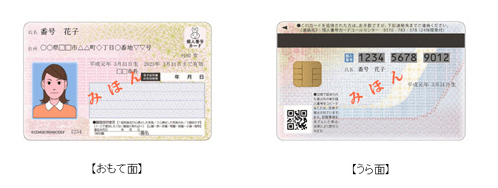
You will also be asked to register for the National health insurance system in Japan and if you want my number card.
Some of the processes are not necessary if you plan to only study in Japan and going back to your country after. But those process is very important if you plan to establish yourself in Japan in a long term. The Individual Number (My Number) is used in these three areas; social insurance, tax, and disaster countermeasures within Japan. You will be provided a 12 digit My Number when you create a resident certificate for the first time after your arrival in Japan. There is an expiration date for the Individual Number Card, so unless you complete the extension procedure at a municipal office before the card’s expiration date, it will become invalid. This card is really useful if you plan to receive money from western union or another money transfer office in Japan. They will require my number. The card will also make your life much easier when you will have to send a package from a convenience store or paying bills.
It take 3 month to do.
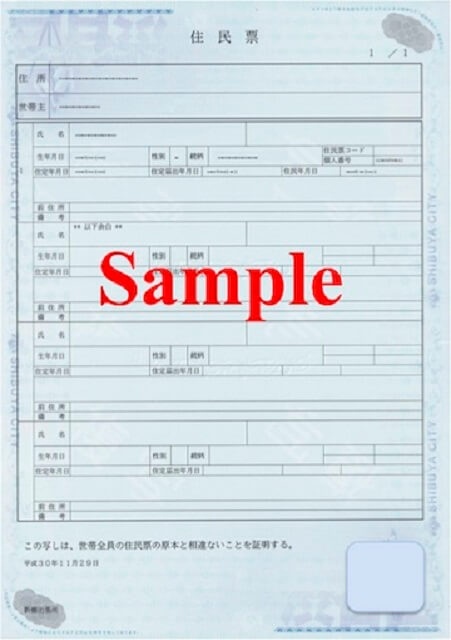
jūminhyō (住民票)
A Juminhyo is a registry of current residential addresses maintained by local governments in Japan. The Basic Resident Registration is a database containing everyone’s resident record, which lists data including your full name, date of birth, sex, address, and relationship to the householder.
You have to ask for your juminhyo at the same time as the procedure of your address declaration. It will cost you 300 yens and you will have to keep it cause it’s really useful. Also will waiting for your “My number card” you can ask the city hall that they write your number on your juminhyo.
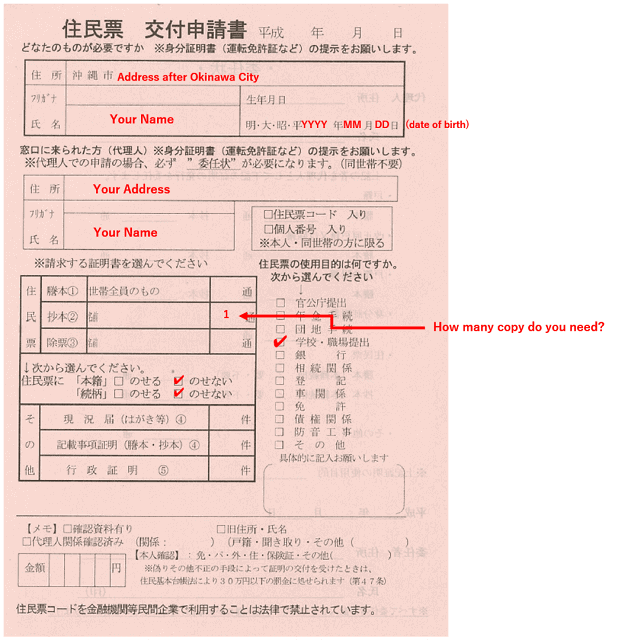
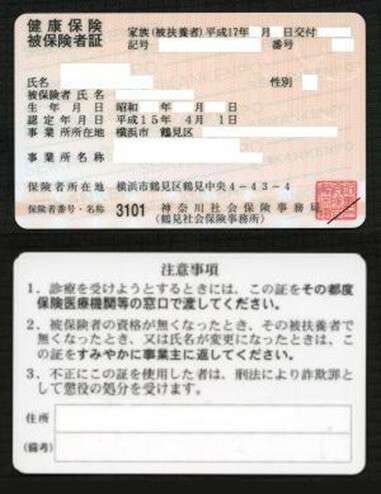
Japanese National Health Insurance (国民健康保険).
If you plan to study in Japan for more than 3 months, you need to go to your local ward or city officeJapanese health insurance card and get your Japanese Health Insurance there. In order to do this, simply show your Residence card and passport, and fill out the forms. Even tho they have a possibility to have money back at the end of your study if you come back to your country, every citizen must register to the national health insurance system. When renewing your visa or change it to a working visa the immigration is sensible to the fact that you paid your taxes or not. Medical expenses can be costly. Therefore, subscribing to the National Health Insurance is mandatory. The insurance premium has to be paid monthly or yearly once registration is completed. The premium varies depending on location and income. In most cases, the premium is about JPY 20,000 per year for foreign students in Japan. Once registered with the National Health Insurance, you will only need to pay 30% of your medical bills.
It’s also highly recommended to subscribe to private insurance in your country in order to cover unexpected expenses. You will receive a pink card that you will have to show at any medical expense in Japan. In Japan, medicine is very developed especially in big cities like Tokyo, Kyoto, and Nagano so nothing to worry about on that
When you register your address, got your juminhyo, applied to the health insurance, and asked for your “My number card” you did the biggest part. Normally you can make it all at the same time but depending on the city hall it might take a couple of hours.
Now you need to open a bank account and get a Japanese phone number. You can use service from your country about bank and phone number. However, if you can it’s highly recommended to do it in Japan especially if you planned to stay in a long term. It will also make your life easier.
Something about the Japanese system is that you need a Japanese phone number to open a Japanese bank account. But you need a Japanese bank account to subscribe to have a phone number. At first, it makes no sense but it’s possible to make it.
I recommend you first open a bank account with a friend or a trustworthy person who has a Japanese phone number. However now in japan, some company accept to give you a Japanese phone number and credit your foreign bank account.
The Japanese bank is reticent to open a bank account to foreigners and students in general. Most of the banks will ask you to prove that you live in Japan for over 6 months before opening a bank account with them. This is the reason that I highly recommended you to open a bank account with Japan post-Bank JP bank. Who accepts foreigners.
Some city hall and japan post bank have English and foreign language services. I highly recommend you to check before on the internet which place provide foreign language services. For example in Tokyo, you have high chance to find foreign language services in the center of Tokyo like Shinjuku than in a small area.
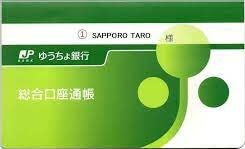
JP japan post bank
Payments for utility bills and direct deposit of paychecks are made entirely through your bank account in Japan.
A subsidiary of Japan Post Holdings (Japan Post), JP Bank handles postal deposits and banking services. As a result, JP Bank is often attached to post offices nationwide with as many as 234 locations. It is a practical, convenient choice for many.
When opening a bank account, you must bring your passport, your residence card, and a personal seal (engraved with your surname) if you have one. The bank teller will then hand you an application form to fill in with your full name, address, and other necessary information. The next section will introduce application terms in Japanese and English side-by-side, so please refer to those tables. JP Bank’s official website allows you to fill in an application ahead of time with step-by-step instructions in English, Vietnamese, Chinese, Korean, and other languages.
Once you’ve finished opening an account with JP Bank, you’ll receive a bankbook at the window. Those who selected “bankbook and card” in the cash service method field can deposit and withdraw money with this bankbook.
An ATM card will be delivered to your address in about one to two weeks. It is not left in your mailbox but rather delivered by hand, so you have to be home to receive it. If you’re not at home when the card is delivered, an attempted delivery notice should appear in your mailbox. Follow the instructions on the delivery notice to enter your desired time for redelivery. A postal worker will attempt redelivery within the specified timeframe.
In japan you can also apply for many money application like Line pay / pay pay / Au pay who allow you to pay with your phone and having many reductions and coupons
Phone Company in Japan
In Japan, you have many phone company like :
Soft bank, rakuten mobile, docomo, etc… They all have a special offer for students provided in English and foreign languages and they also have English speaker staff. You can then compare the offers and choose the one you like.
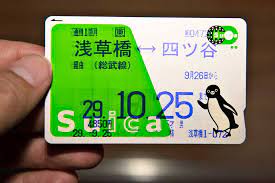
Commuter pass
Depending on your campus ISI has differents partnerships with some trains company to allow you to have low cost for your transportation expenses from your home to the school. If you need more information don’t hesitate to go to your school information point.
However, the train company has a monthly normal pass. You can get it to the train company office directly and it will allow you to take the train between your home and your school with unlimited traject and to enjoy all the station between who are also covered.
YATTA ヤッタ / Hooray
Now you are registered at the city hall, you got your juminhyo, your health insurance card and your “my number card”. You opened a Japanese bank account and got a Japanese phone number as well as a commuter pass. You are now ready for Japanese life. You will see that in japan you have many ways to make your life easier, like getting the card of your nearest supermarket for example and more. You can always ask to the information point of your school for any question and we will help you as much as we can. In our curriculum, we also teach you how to act in Japanese society. You will then learn how to withdraw money, taking orders at a restaurant, asking for your direction, and all the daily life. All in Japanese and by learning many grammatical points and vocabulary. While learning Japanese at ISI you also learn how to live in.
I really hope that this blog will be useful to you and that it will allow you to start your new life in Japan in the best conditions.

